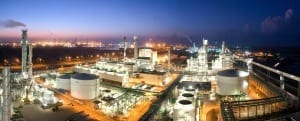 thyssenkrupp Industrial Solutions AG (Essen, Germany; www.thyssenkrupp-industrial-solutions.com) has supplied and recently commissioned Egypt’s largest nitrogen fertilizer complex (photo). It is located in the Damietta free trade zone, some 160 km north-east of Cairo, and will be operated by the Egyptian Nitrogen Products Co. (ENPC), a wholly owned subsidiary of Misr Fertilizer Production Co. (MOPCO). When running at full capacity, the plant will be capable of producing 2,400 ton/d of ammonia and 3,850 ton/d of urea.
thyssenkrupp Industrial Solutions AG (Essen, Germany; www.thyssenkrupp-industrial-solutions.com) has supplied and recently commissioned Egypt’s largest nitrogen fertilizer complex (photo). It is located in the Damietta free trade zone, some 160 km north-east of Cairo, and will be operated by the Egyptian Nitrogen Products Co. (ENPC), a wholly owned subsidiary of Misr Fertilizer Production Co. (MOPCO). When running at full capacity, the plant will be capable of producing 2,400 ton/d of ammonia and 3,850 ton/d of urea.
Greg McGlone, managing director of ENPC says, “We are elated to have continuous production at our new world-scale fertilizer complex in Damietta. Together with our partner thyssenkrupp, we were able to successfully take this mega-project from start to completion, despite the extremely challenging political and economic circumstances in Egypt over the past nine years.”
Ralf Richmann, CEO of the Fertilizer & Syngas Technologies business unit of thyssenkrupp Industrial Solutions says, “This project demonstrates once again the immense trust of the major players within the fertilizer industry in our technological capabilities and decades of experience gained in the construction of more than 130 fertilizer plants worldwide. We are therefore in a position to offer our customers throughout the world optimum solutions for maximum cost efficiency, reliability and environmental compatibility.”
ENPC commissioned thyssenkrupp to build the new turnkey fertilizer complex, including two ammonia and two urea plants, as well as various offsite and related utility systems, product handling and storage facilities in the year 2007. Being the largest single fertilizer contract in the history of thyssenkrupp up until then, it included the entire engineering (basic and detail), supply of the equipment, construction and commissioning.
The ammonia plants are based on thyssenkrupp’s proprietary ammonia process while the urea plants will use Netherlands-based Stamicarbon’s process. All selected processes are particularly environment-friendly and comply with stringent Egyptian and European standards.